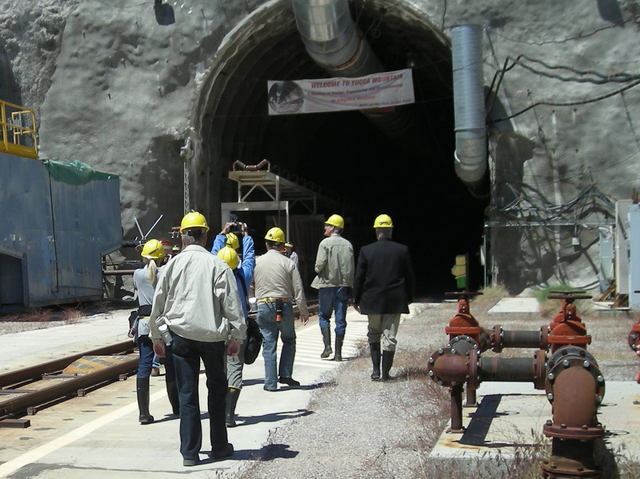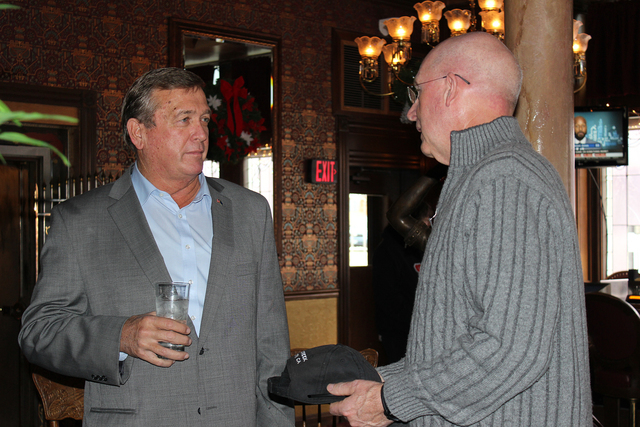Hardy’s proposal for Yucca jolts Nevada
WASHINGTON — A call for Nevada to begin talks with the federal government over Yucca Mountain re-awakened strong feelings on Sunday over the prospects of burying high-level nuclear waste in the state.
Debate about the once-proposed nuclear waste site largely had faded in the five years since the Obama administration moved to terminate the controversial project. But a suggestion by Rep. Cresent Hardy, R-Nev., that Nevada reconsider its refusal to negotiate served as a jolt, at least for the moment.
Yucca Mountain “is an issue that long ago lost its middle,” Hardy wrote in an opinion column published in the Las Vegas Review-Journal and on reviewjournal.com. The freshman Republican said Nevada might be able to negotiate for more Colorado River water, or for permanent increases in education or infrastructure money in exchange for hosting a waste repository.
Sen. Harry Reid, D-Nev., the father of a Nevada strategy that set a goal of killing the Yucca program, said Hardy’s proposition was naïve.
“Rep. Hardy is living in a world that doesn’t exist,” Reid said on Sunday. “Opening the door to a nuclear dump Nevada is not something I will ever accept.”
“There is no middle ground when it comes to protecting Nevada,” added Rep. Dina Titus, D-Nev.
But comments Sunday and in recent weeks by other top Nevada Republicans indicate Hardy may not be alone.
In a written statement Sunday, Rep. Joe Heck, R-Nev., echoed Hardy that “Nevada deserves a seat at the table in the Yucca Mountain debate.” He said studies and a licensing process that might show for sure whether the site is safe or not should be allowed to run their course.
“We can’t begin that debate until all evaluations are complete,” Heck said. “Those evaluations may reveal that the site is better suited for small scale research as opposed to large scale storage, but until we have a completed evaluation process we will never know.”
Rep. Mark Amodei, R-Nev., could not be reached on Sunday. But in an interview in February with Nevada blogger and columnist Thomas Mitchell, he expressed similar thoughts, suggesting state leaders should engage instead of “just screaming no.”
Amodei in the interview said he was willing to talk about funding for Interstate 11 from Las Vegas to Phoenix, rural economic development and boosting nuclear waste reprocessing research at UNLV.
“Let’s leave a favorable footprint in Nevada” if it is inescapable that 49 other states want to bury nuclear waste there, Amodei told Mitchell.
Nevada has battled against Yucca Mountain in the courts, at technical symposiums and on Capitol Hill, where Reid used his influence as a Senate leader annually to underfund, and ultimately zero out, federal money for the multi-billion dollar project.
Beginning in 1987, when Nevada was singled out for nuclear waste in a U.S. Capitol backroom by lawmakers from states with more clout, state officials have gathered evidence they insist shows the proposed repository 100 miles northwest of Las Vegas would be unsafe.
“Nevada’s own experts, the Nuclear Waste Project Office, have worked for years with scientists and technical experts to reveal that Yucca Mountain is a highly risky, half-baked proposal riddled with technical flaws that guarantee eventual failure,” Reid said.
But studies released in recent months by Nuclear Regulatory Commission staff have been more favorable to the site. They conclude the mountain’s natural features coupled with a combination of drip shields and corrosion-resistant canisters in storage tunnels could keep decaying nuclear material from leaking into groundwater for periods up to a million years.
A resolution to the technical debate could play out in NRC licensing hearings. But Congress would need to appropriate more than $330 million for those to take place, and also order the Department of Energy to come off the sidelines and take part. Reid has signaled that’s not going to happen as long as he is in office.
In the meantime, allies and potential friends flocked to Hardy while critics stepped up criticism. The freshman Republican who took office in January became the first Nevada member of Congress to publicly reject the state’s long-held strategy to refuse negotiations over Yucca Mountain.
A group of 8-10 members from the Progressive Leadership Alliance of Nevada plan to seek an appointment with Hardy when they are in Washington for a conference next month, according to PLAN co-founder and state director Bob Fulkerson.
Fulkerson, a veteran activist against the Yucca project, said Hardy’s call for talks was highly damaging to Nevada.
“I think it’s like making a deal with the devil to begin negotiating our surrender on becoming the world’s first high-level nuclear waste dump and Congressman Hardy is doing our state a huge disservice by waving the white flag of surrender, which is what he is doing,” Fulkerson said. “We think it is a horribly misguided, short-sighted position for him to take.”
On the other hand, Alex Flint, a senior vice president of the Nuclear Energy Institute, said Hardy’s writing “reveals the same thoughtful, pragmatic approach that the nuclear industry, and many other industries, use daily in their relationships with the communities in which they operate.”
Flint said nuclear projects “provide high paying jobs, taxes, and their employees sustain communities. Ideally, the Department of Energy could be a good neighbor to Nevadans. We strongly support efforts to explore the possibilities outline by the congressman.”
Nye County Commissioner Dan Schinhofen, who coordinates pro-Yucca lobbying for the county in which the site is located, said Hardy was doing his job of representing his constituents.
Hardy was elected to the 4th Congressional District, which includes most of northern Clark County, part of Lyon County, and all of Nye, Esmeralda, Lincoln, Mineral and White Pine counties.
“We need a conversation” on Yucca, Schinhofen said. “That’s all we’re asking the state to do, sit down and talk. There’s been a seat at the table but Nevada has refused to pull the chair out and sit down.”

















